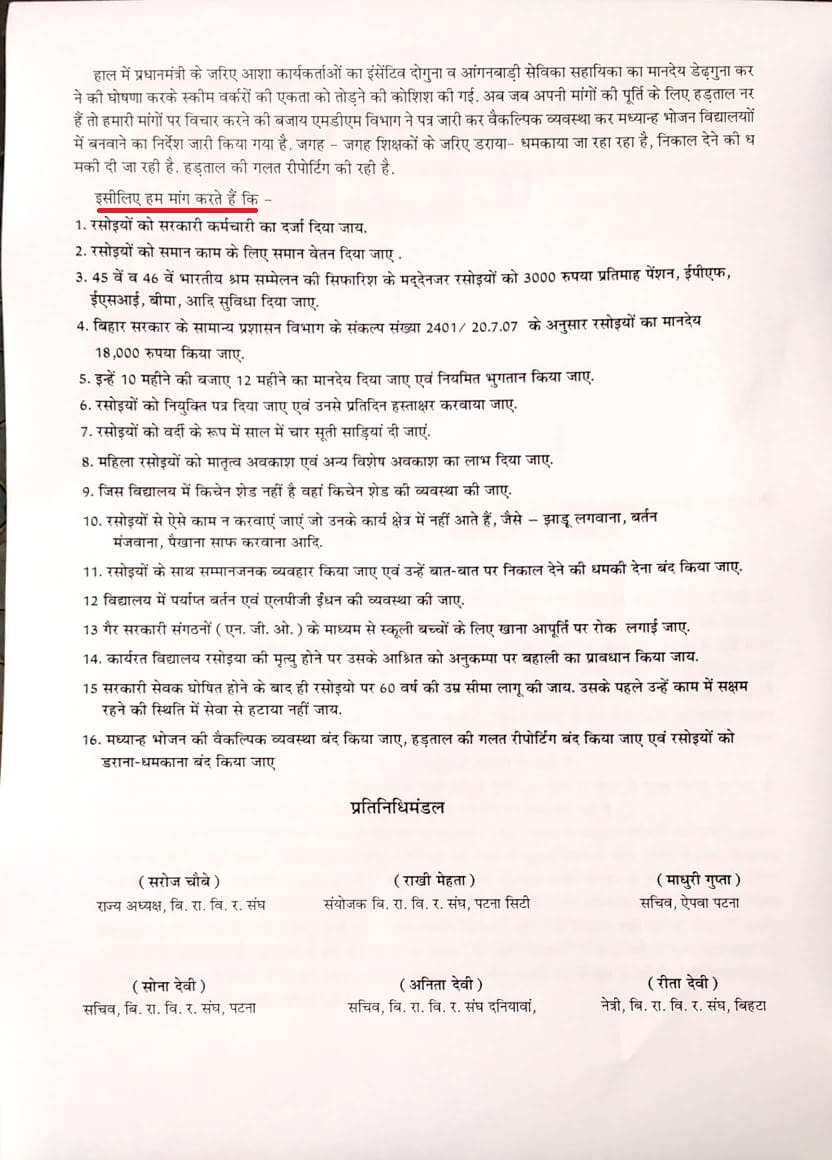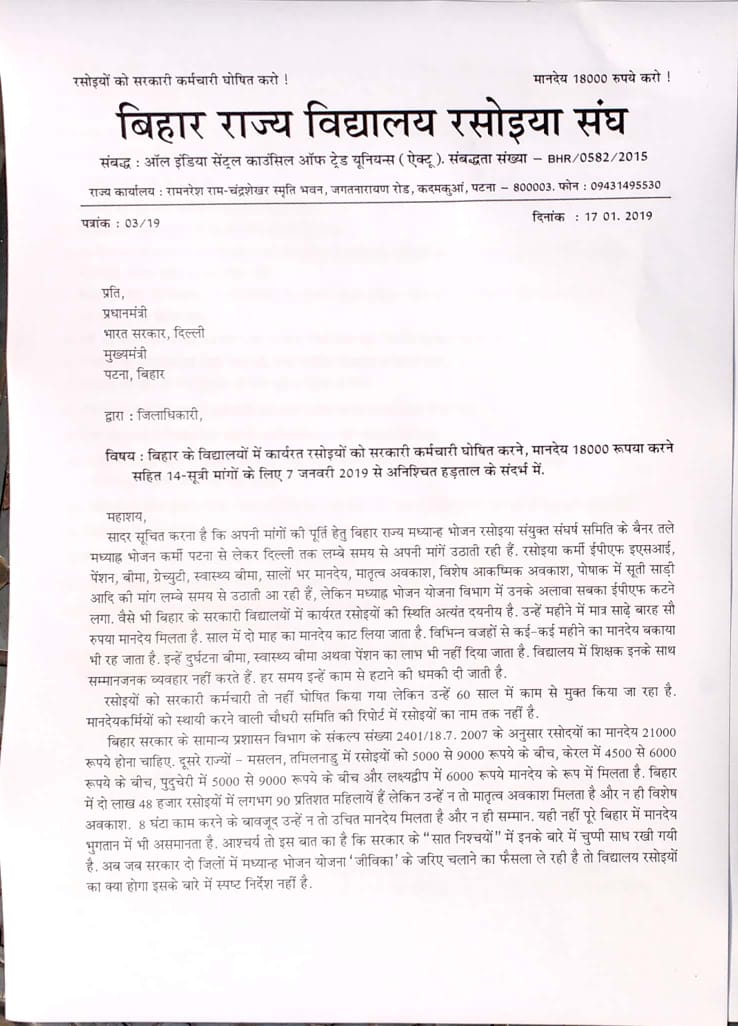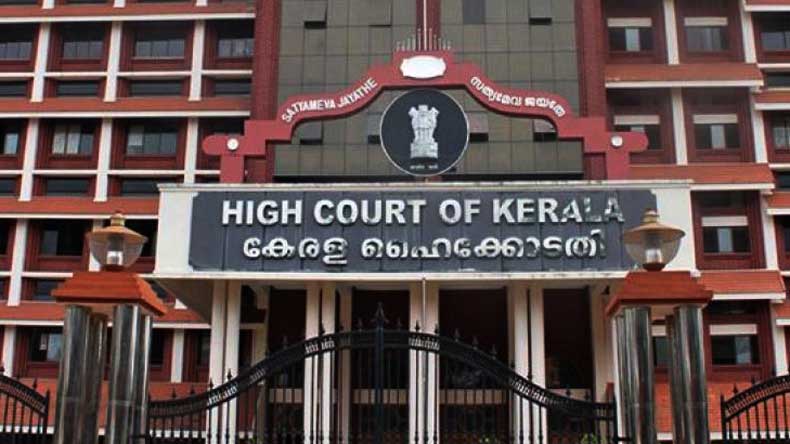Nitish Kumar government in Bihar is facing continuous heat of scheme workers statewide. Last month it was an indefinite strike of Accredited Social Health Activists or ASHA workers and this time Mid-Day Meal (MDM) workers have hit the streets with their demands which primarily includes minimum wage.
There are 2,48,000 midday meal cooks in over 70,000 primary and middle schools in the state who are on indefinite strike for the last 14 days. Starting from Patna their outrage is being witnessed in districts such as Darbhanga, Samastipur, Bhojpur, Muzaffarpur, etc.
Sona Devi, a mid-day meal worker at Bankipur middle school in Fatuha of Patna district said, “Since 7th January we rasoiyas (cook locally known as rasoiya) are on statewide indefinite strike. An honorarium of meagre Rs 1250 is not sufficient for us so we are demanding Rs 18,000/month.”
In conversation with Newsd Bihar State President of Bihar Rajya Vidhyalay Rasoiya Sangh, Saroj Choubey said, “Since 14 days mid-day meal workers on strike but still government remains unaffected by our agitation. We have burnt the effigy of CM Nitish Kumar. We demand government workers status for rasoiyas with all benefits of social security (Provident Fund, Pension, ESI). They shouldn’t be threatened from school authorities just because they are on strike.”
If our demands are not heard and acted upon we are going to intensify our movement just as ASHA workers strike which went on for one month seven days- she added further.
Demands of Mid Day Meal Workers:
The indefinite strike began under the banner of Bihar Rajya Madhayan Bhojan Rasoiya Sanyukt Sangarsh Samiti. It is a joint struggle of different federations and associations of mid-day meal workers supported by four trade unions — Centre of Indian Trade Union (CITU), All India Trade Union Congress (AITUC), The All India United Trade Union Centre (AIUTUC) and All India Central Council of Trade Unions (AICCTU).
There are 16 demands of mid-day meal cooks and few among them are as follows:
- Declaration of MDM workers as government workers;
- Equal pay for equal work;
- According to 45th & 46th Indian Labour Conference(ILC) social security benefits such as pension, provident fund, insurance, etc;
- An honorarium of Rs. 18,000 per month;
- Facility of maternity leave;
- Honorarium for 12 months;
- Saree as dress code;
- Kitchen infrastructure in schools;
- No intervention of Non- Governmental Organizations (NGOs) in preparation and supply of mid day meal to students.

The central and state governments share the cost of the Mid Day Meal Scheme, with the centre providing 60% and the states 40%. The central government provides grains and financing for other food whereas the costs for facilities, transportation, and labour is shared by the state governments.
Social activists have also remained critical about Bihar’s performance in providing mid-day meal to children. New Delhi-based food rights activist, Dipa Sinha, says governance is a big problem in Bihar. There is no grievance redressal at the local level. This is not only breeding corruption but also resulting in mass illness and death of children. Weak vigilance committee is another area of concern.
History of Mid Day Meal:
Mid Day Meal in schools has had a long history in India. In 1925, a Mid Day Meal Programme was introduced for disadvantaged children in Madras Municipal Corporation.
By the mid 1980s three States Gujarat, Kerala and Tamil Nadu and the Union Territory of Pondicherry had universalized a cooked Mid Day Meal Programme with their own resources for children studying at the primary stage by 1990-91 the number of States implementing the mid-day meal programme with their own resources on a universal or a large scale had increased to twelve states.
The National Programme of Nutritional Support to Primary Education (NP-NSPE) was launched as a Centrally Sponsored Scheme on 15th August 1995 with a view to enhancing enrollment, retention and attendance and simultaneously improving nutritional levels among children,
It was further extended in 2002 to cover children in classes IV of Government, Government aided and local body schools,
In September 2004 the scheme was revised to provide cooked mid-day meal to all children studying in classes IV in Government and aided schools and EGS/ AIE centres.
In October 2007, the scheme was further revised to cover children in upper primary (classes VI to VIII) initially in 3479 Educationally Backwards Blocks (EBBs). Around 1.7 crore upper primary children were included by this expansion of the scheme.
From 2008-09 i.e 1st April 2008, the programme covers all children studying in Government, Local Body and Government-aided primary and upper primary schools and the EGS/AIE centres including Madarsa and Maqtabs supported under Sarva Shiksha Abhiyan of all areas across the country.
Mid-day meal workers are paid nearly Rs 6,000 in Tamil Nadu, Rs 2,500 in Haryana and Rs 1,800 in Punjab but Bihar pays the lowest to its cook i.e. Rs 1250 only that too for 10 months and not for all 12 months of the year. It should be noted that the central government, which supports the scheme, however, did not revise the payment fixed way back in 2009. The amounts above the central allocation are met by state governments.
Bihar government assured the ASHA workers of higher honorarium, after which they called off their month-long strike last week but the ongoing strike of mid-day meal workers may gain momentum and become vigorous if the state government does not pay heed to their demand.



















